Do Cardinals Eat Caterpillars and Hunt Insects?
Cardinals’ are known for consuming seeds, fruits, and insects, but it remains a mystery whether they eat all insect types or not.
For example, do cardinals eat caterpillars? What do you think? Indeed, cardinals eat caterpillars during the breeding season and food shortage. Usually, they don’t prefer devouring these animals; they only opt for eating caterpillars whenever they find this food source near their habitats.
But not all caterpillars are on their menu. Curious about which ones they avoid? Keep reading to find out more about cardinals’ caterpillar-eating habits!
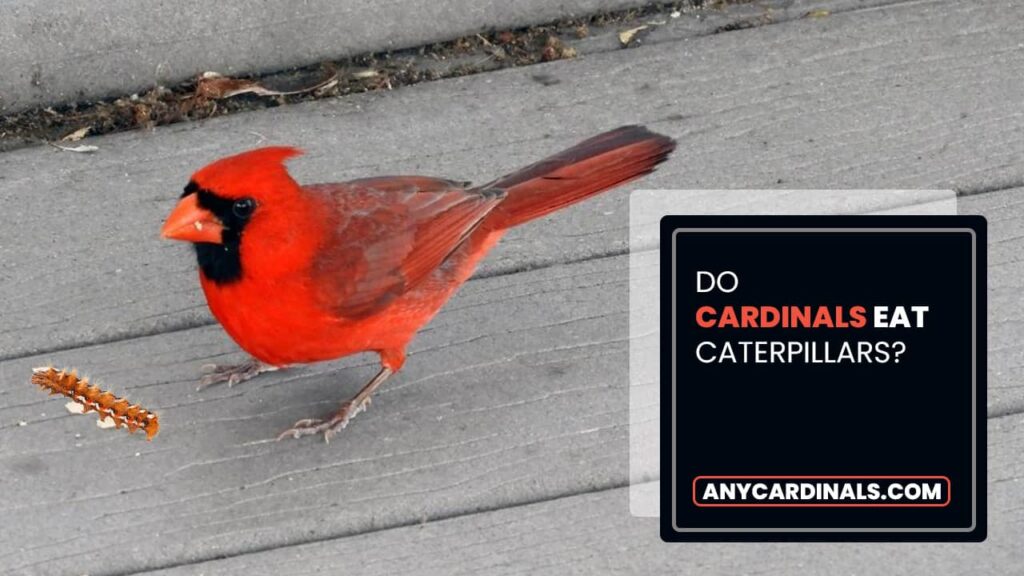
Want to learn more about cardinals food and diet:
Why Do Cardinals Eat Caterpillars?
Cardinals turn to caterpillars when seeds and fruits are scarce, particularly in spring and summer during breeding. Caterpillars provide protein, vitamins, and fats crucial for energy and chick growth.
They also help control pest populations, making cardinals valuable to gardeners. By eating caterpillars, they reduce damage to plants and crops.
Their caterpillar consumption peaks in spring to meet high protein demands for nesting, per Cornell Lab.
Caterpillar Types Eaten By Cardinals: A Definitive List Of Most-Asked Questions
In this section, we have answered all the questions related to whether cardinals consume all caterpillar types or not.
We have also shared some added information in the format of answering questions.
So, without delaying more, let’s read on.
Do Red Cardinals Eat Caterpillars?
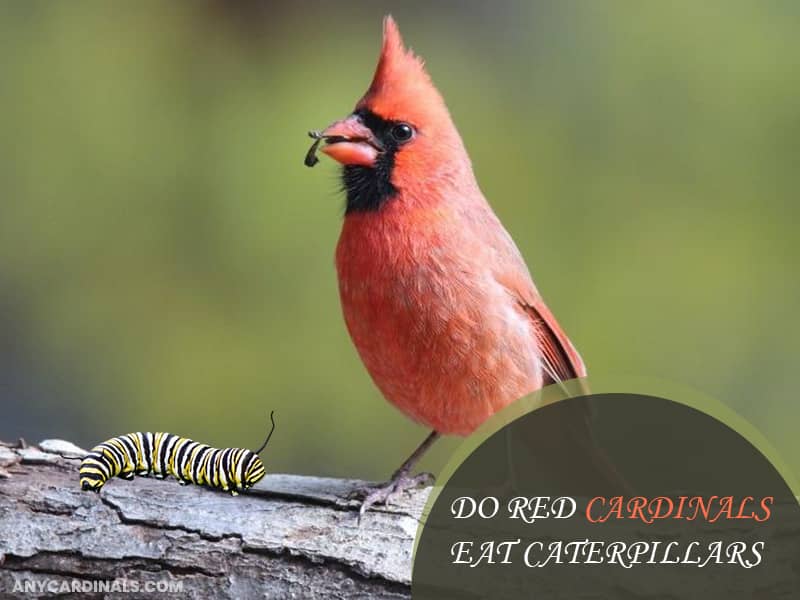
Indeed, red cardinals eat caterpillars. These nonmigratory birdies consume grasshoppers, caterpillars, beetles, stink bugs, and cicadas, especially when they don’t find their favorite food item: sunflower or safflower seeds.
They target soft-bodied caterpillars, which are easier to digest, especially during food scarcity, per Audubon Society.
Do Cardinals Eat Butterfly Caterpillars?
Yes, cardinals gobble butterfly caterpillars, along with butterfly eggs and larvae. As omnivorous birds, they eat nearly anything to satisfy hunger, especially during breeding season.
Butterfly caterpillars offer high protein, supporting muscle development in fledglings.
What Other Insects Do Cardinals Eat Other Than Caterpillars?
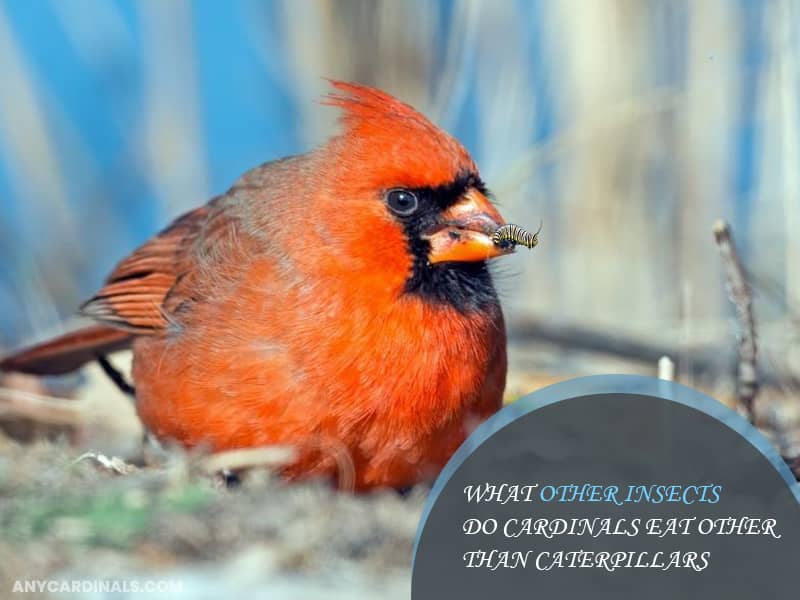
While cardinals are seed lovers, they prey on various insects during food shortages. Their diet includes beetles, crickets, katydids, leafhoppers, cicadas, flies, centipedes, butterflies, and spiders.
Ants and termites are also common snacks, providing quick energy boosts, per National Wildlife Federation.
Do Cardinals Eat Monarch Caterpillars?
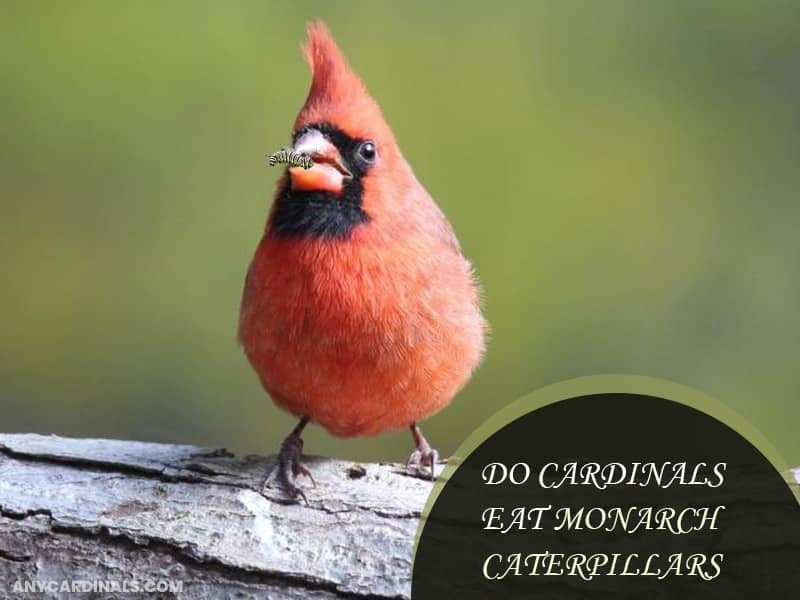
Cardinals feed on monarch caterpillars like brown thrashers, robins, sparrows, scrub jays, and other birds. But they don’t frequently eat monarchs; cardinals only go after monarchs when they find them near their habitats.
Monarchs’ milkweed diet makes them less palatable, reducing cardinals’ preference.
Do Cardinals Love Eating Monarch Caterpillars?
Cardinals don’t love monarch caterpillars due to their infrequent consumption. Monarchs contain chemicals from milkweed, giving them a bitter taste that cardinals avoid when other food is available.
Only hungry or opportunistic cardinals eat monarchs, preferring tastier options.
Are Caterpillars Poisonous?
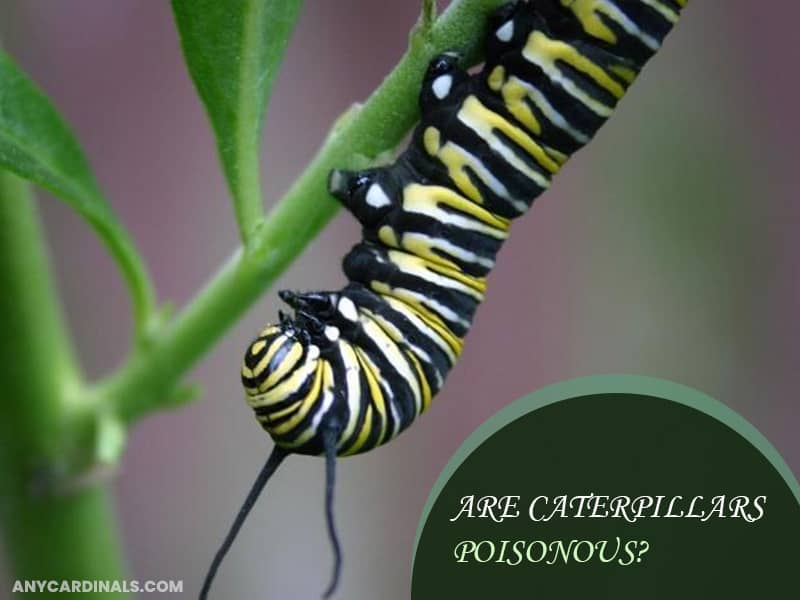
Most caterpillars aren’t poisonous, but some species contain toxins harmful to birds. Puss moths, saddleback moths, gypsy moths, buck moths, flannel moths, and Automeris io moths can cause irritation or illness.
Cardinals instinctively avoid these toxic species, focusing on safer prey.
How Many Caterpillars Do Cardinals Eat In A Day?
A full-grown cardinal can eat up to 300 caterpillars daily to meet protein needs. For families, this number may exceed 1,000 as parents gather food for chicks.
Consumption varies by season, peaking during chick-rearing when protein demand is high.
Do Baby Cardinals Eat Caterpillars?
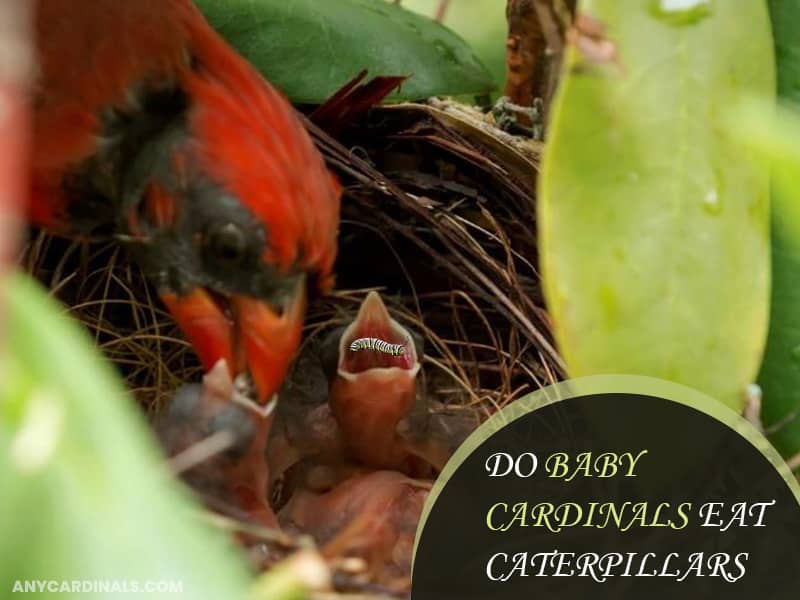
Yes, baby cardinals eat caterpillars. Parents feed nestlings almost exclusively insects, with soft-bodied caterpillars providing protein for muscle and feather growth.
Caterpillars are mashed by parents to ensure easy digestion for chicks.
Do Cardinals Eat Gypsy Moth Caterpillars?
No, cardinals avoid gypsy moth caterpillars, which are toxic. Other birds like bluebirds, catbirds, and bluejays consume them, but cardinals steer clear.
Gypsy moths’ chemical defenses deter cardinals, protecting them from harm.
Do Cardinals Eat Brown Tail Moth Caterpillars?
Northern cardinals don’t eat brown tail moth caterpillars, but some subspecies, like indigo buntings, may. These caterpillars are generally avoided due to their irritating hairs.
Their hairy texture makes them unappealing to most cardinals.
Do Cardinals Eat Fuzzy Caterpillars?
Cardinals avoid fuzzy or hairy caterpillars, like woolly bears. The reason is unclear, but their texture may deter cardinals from preying on them.
Fuzzy caterpillars’ bristles may pose a choking hazard or irritation.
How Do Cardinals Hunt Caterpillars?
Cardinals hunt caterpillars by foraging on low branches, shrubs, and the ground. They use their strong beaks to pluck caterpillars from leaves or soil.
They often hunt in pairs or small groups during breeding, scanning foliage for movement. Their keen eyesight helps spot camouflaged prey.
They prefer hunting in dense vegetation where caterpillars hide, per Audubon Society.
How Can Cardinals Help Control Garden Pests?
Cardinals are natural pest controllers, eating caterpillars and other insects that damage plants. By attracting them to your garden, you reduce the need for chemical pesticides.
Plant native shrubs like dogwood or serviceberry to provide food and shelter. Install feeders with sunflower seeds to keep cardinals visiting.
Their pest control benefits save gardeners time and money while supporting biodiversity, per National Wildlife Federation.
Wrapping Up
So, cardinals, the seed eaters’ primary food source, isn’t the seed only. They consume a wide range of food, and caterpillars are one of those food sources. The benefit cardinals get by gobbling caterpillars is that these animals provide the required vitamins, protein, and nutrients cardinals need to thrive.
However, now you know whether cardinals eat caterpillars or not. Next time when someone asks you this question, you can easily answer their questions or share this article with them on Facebook, Pinterest and Twitter. That’s all for this content.

